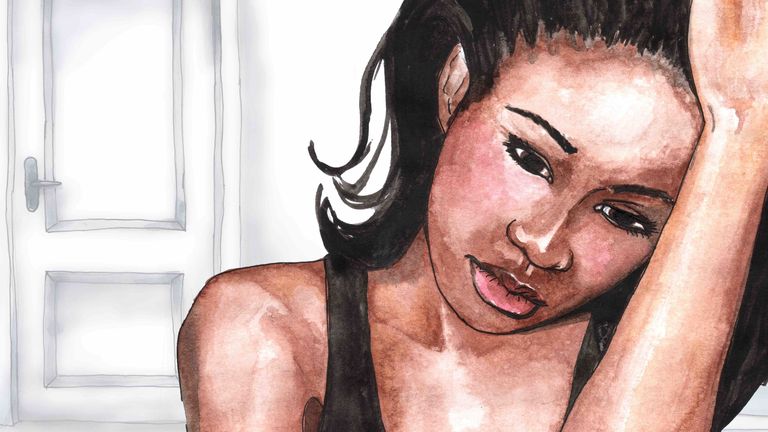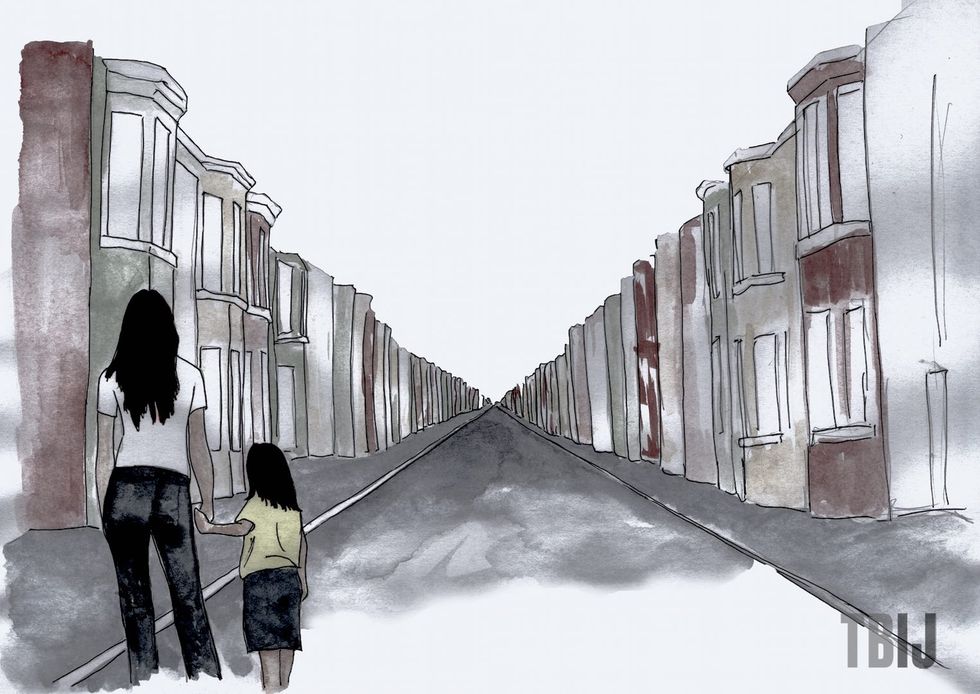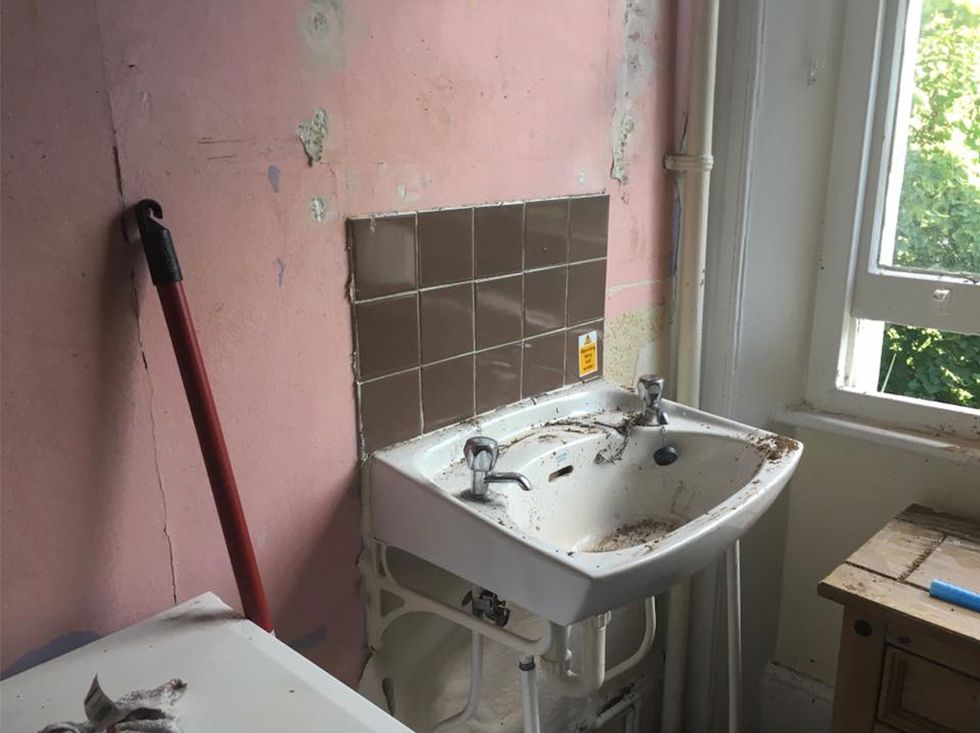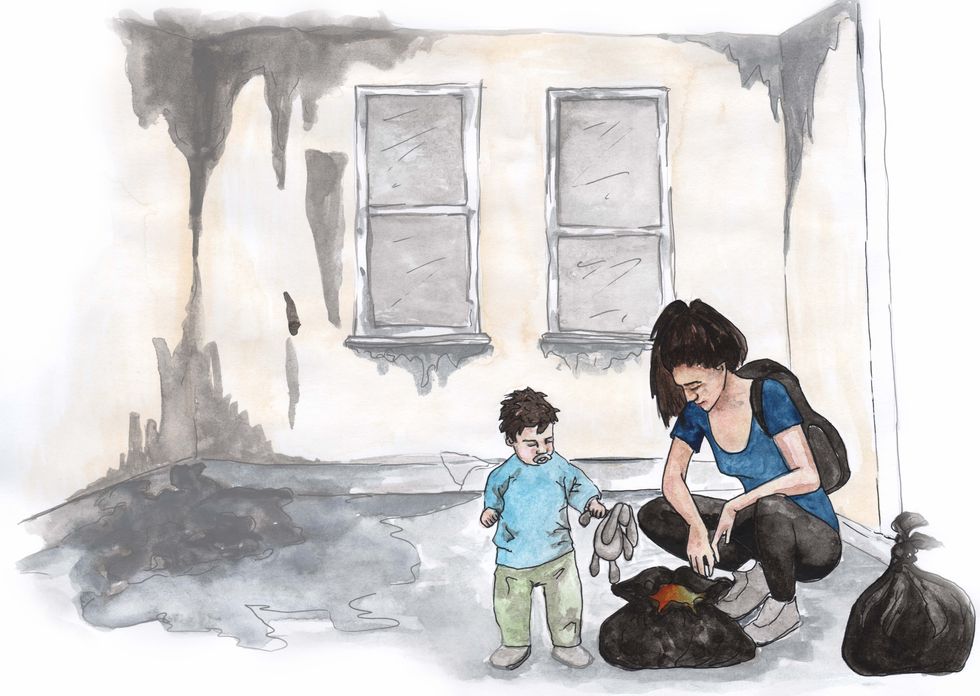Three months ago, the ceiling of a West London refuge for domestic abuse survivors caved in. From hotels to B&Bs, ELLE follows the the journeys of seven women as they face squalid conditions, insensitive support workers and council incompetence in the hope of getting help
It was a little after one in the morning when Susan's world came crashing down for the second time.
She was woken in the middle of the night by commotion from the room above her. A huge chunk of the ceiling, sodden with heavy rain, had come tumbling in.
Bleary-eyed and scared, Susan wandered out to the hall. The other residents of the building, seven women ranging in age from early twenties to late fifties, had gathered their young children and made a makeshift shelter in the communal living room.
'We were terrified, we were sleeping on mattresses on the floor,' Susan recalls.
The women say they had been complaining about leaks for weeks, as well as malfunctioning fire alarm and an infestation of mice and insects.
This was not just another case of a rogue private landlord. These women were living in a domestic violence refuge located in one of the most affluent boroughs in the UK, Kensington and Chelsea.
Refuges video from The Bureau on Vimeo.
The Bureau of Investigative Journalism has been following the stories of six of the seven women housed in that shelter for the past three months as they have been buffeted around the social services system, from hotels, to council meetings, to lonely flats. The seventh woman has dropped off everyone's radar.
We have also found that local authorities all over England have cut their funding for women's refuges, on average by 23%. In Kensington and Chelsea, however, the cuts are even more stark, with refuge funding plummeting 45% in that period.
In the weeks following the emergency the women felt ignored, housed in unsuitable premises and inadequately unsupported. Two have been hospitalised with suicidal thoughts and two are living on the floors of friends and family. One woman has been located by her ex-partner.
Two days after the roof fell in I meet the women on the steps of the Kensington and Chelsea council buildings. Jessica, an older woman, leans her arm on her walking stick to steady herself as she fishes out her mobile phone. She shows me image after image of her room at the refuge, covered in rubble and dirty water.
The council is telling some of the other women, including Susan, that they should move back into the refuge. While they were explaining this, in the council offices, the ceiling of Susan's room caves in. Now she is not sure where she will go. 'I'm just so nervous,' she says, tears falling down her cheeks.
It is another two days before I meet the women again. By now they have been housed in Travelodge hotels around the city. Some are in the same hotel as the traumatised survivors of the Grenfell tower fire which broke out in the early hours of 14 June, 2017.
Fatma had been at the refuge for around a month. She left her abusive husband after years of torment, taking her young son with her.
At home Fatma had learnt to stifle her screams of pain during attacks so as not to wake her sleeping child. Last night, in the hotel, she woke him up with her sobs. The stress had all become too much.
She does not know where she will end up next.
'I am thinking maybe we will go and sleep in Chelsea Hospital lobby,' she says, her eyes tired. 'I have my son's pushchair and his cosy coat because I don't want him to be cold. I think I will take him in his pushchair and sit in the lobby.If someone asks me, I will say it is an emergency I am waiting for something. This is my plan,' she says, breaking down into tears.
In the room next door Susan is furious. Notting Hill Housing have tweeted, saying: 'The residents have all been provided local accommodation until they can return sometime this week.' Susan, using the women's group Twitter account, has responded with one word: 'Lies.'
'One of the things my ex-husband used to do was get mad at me and tear up my things and break my things... It felt like as soon as I had left that place and managed to get the things I cared about most, here I am in this women's refuge and it's got destroyed as well and I've just got nothing left.'
Susan's marriage started happily, but after six months her husband became violent.
'There were times where he had choked me, grabbed me by the neck and thrown me down on the ground. There were times when he'd taken a telephone charger cable, and the metal end of the bit, and whipped me with it, hit me in the face, I had welts all over my face, one across my cheek, I had to lie about what had happened.'
One day, after she had been woken in the night by her husband dragging her off the bed and punching her repeatedly, she decided she had to leave.
'I called a domestic violence helpline and I said that I need help now. The support worker wanted to put me in a refuge that day, which didn't happen…it took longer than that…she said 'call as many friends as you can', she said 'I know it's embarrassing, call 'em, call 'em, just see who will pick up, and that's what I did.'
Susan ended up spending weeks on her friend's floors before they found a refuge for her. Her situation is far from unique; a recent report from the charity, Women's Aid, found that because refuges are full to capacity women spend an average of one to two weeks waiting for a place to open up. In one case, a woman waited six months.
The Bureau surveyed 40 refuge managers across England; 38 of them told us that they had turned women away in the last six months because they either did not have the space or they no longer had funding for the support services to meet the woman's needs. While women wait for a space to become available in a refuge, they remain in danger. One woman we spoke to said that the police had been called out to her flat four times while she was waiting to get into a refuge.
When she arrived at the Hestia refuge, located on a quiet side street in Kensington and Chelsea, Susan thought she was safe. However, the refuge was hardly homely. Mice and insects infested the eight bedroom building and brown patches of damp stained the ceiling.
'I've complained about leaks, I've complained about cockroaches. I've complained about mice, nothing was done – over and over and over again,' Susan says. Hestia says that it did respond to the rodent infestation and had asked the residents not to leave out food. It also acknowledged that a report was made to the Housing Trust about a fire alarm going off, but that an electrician attended and carried out a 'full repair'.
In general, refuges are funded through a combination of housing benefits, which pay for the buildings, and local authority funding which pays for support services, such as support workers, child workers, language specialists and counselling services.
Hestia managed and ran the support services provided in the refuge, but they provided only basic support. The women said that they arranged their own counselling services through their doctors, where they were often put on waiting lists and delayed as medical records were transferred from their homes across the UK.
The charity has held the contract to provide domestic violence services in Kensington and Chelsea for years. In late 2015 they were called to tender again.
In response to a Freedom of Information request the council said it had cut its spending on domestic violence refuges by 45% since 2010. This meant, in turn, that Hestia had to reduce its budget in order to win the contract. Hestia said, in a statement: 'All supported housing services for all client groups have seen significant cuts to funding over the past decade, including refuges for women and children fleeing domestic abuse.'
Council paperwork seen by the Bureau shows the charity agreed to drop their budget by 14% to get the current contract. Officials note: 'The contract value, under the Hestia proposal, would reduce the RBKC contract value from £184k to £158k, delivering a saving of £25k per annum.'
Hestia told the Bureau the contract value for 2017 has been raised again.
The housing association which was responsible for the upkeep of the building, Notting Hill Housing Trust, had also experienced budget cuts in recent years. The company reduced its budget for social housing. The trust explained: 'Over time, we have sought to become more efficient, for example, by reducing management costs, so that we can make our funds go further and ensure we have more money to reinvest in our core purpose - providing more homes for low-income Londoners.'
As the days pass, the women are rehoused, some in bed and breakfast accommodation, others are offered council flats. But the options are not without problems.
Jessica is in her fifties and has health and mobility issues, walking with a stick. The council has not found any space for the women in Kensington and Chelsea borough, instead she is offered a tiny, unfurnished studio flat elsewhere in London. She is not happy.
'I just got the keys for the temporary accommodation, but it is not suitable at all. I have a disability, this is a basement and there are lots of steps, so it is hard to get to the flat,' she explains.
Too scared to stay, Jessica has instead been staying with family.
Carrie and Fatma were also offered flats. Both were unfurnished and they have no idea how long they will be staying there.
Fatma spent five nights without a piece of furniture, her son slept in his pushchair and she made a bed on the floor with a towel, using his disposable nappies as a pillow. Carrie's studio walls were caked in dried-on faeces from the previous tenant.
Three of the women from the shelter have been in real danger since leaving.
Fatma was sent to a flat in a neighbourhood where she feels at risk. She is not from the UK and the area is full of people from her home country. She believes that makes it likely that her violent husband will find her there especially as his job regularly brings him to the area.
Another of the women, Roxanne, is in bed and breakfast accommodation. Her violent ex-boyfriend has tracked her down, but she is too exhausted to move again. 'Besides, I think at least there are people here. If he comes I can shout and the manager or someone might come, if I am in a flat alone there is no one to help,' she says.
Mel, a mother of two small children, was caught in a bind. If she accepts another council flat then she will lose the flat she had before she fled to the refuge. She had lived there for years and was working towards having the Right to Buy. 'I would have had to give up my tenancy. I have had it for 18 years and didn't want to lose it,' she says. Now she and her children are sleeping on air mattresses on a friend's floor.
'We're stuck in the middle,' she explains, 'the council and the police have refused to help me and insist there is no danger, even though my ex-partner was seen outside my house two weeks ago.'
It has been nearly three months since the roof fell in.
None of the women are happy with the way Kensington and Chelsea council have responded. The council told the Bureau in a statement:
'Women who have survived abuse need the best possible care and services to help them rebuild their lives, we know that and we understand that. More money than ever is being invested in these services and the contract given locally to the domestic violence charity, Hestia, was done so through a competitive and fair process in line with all other refuge services across West London. The way in which the service is delivered is the responsibility of Hestia and the maintenance of the building is managed by the owners, Notting Hill Housing Trust. The Council acted immediately to help Hestia temporarily relocate the people at the centre to similar premises where there was room and at short notice. We expect the very best from this service, we are investigating, and will take further action if required.'
It has not been the secure, happy ending the women had hoped for when they left violent and dangerous homes.
'I think at one point I hadn't slept for four or five days, I ended up going to the hospital for urgent care. I literally broke down crying, I was like, 'I need help, I need supervision, I can't do this any more,'' Susan explains.
Some have even considered going back to their abusive partners.
'You just have to make that decision, do you keep fighting or do you give up? And there are so many people that would give up,' Susan adds.
But for now they are all fighting on. 'We had each other and that is the only reason we didn't.'
Additional Reporting by Jasmine Andersson.
If you need to talk to someone about domestic violence contact Women's Aid/Refuge free helpline on 0808 2000 247. If you are in immediate danger, call 999.
All illustrations are by Ella Paton, a member of the Bureau Local network. Her work can be viewed here.

















